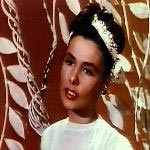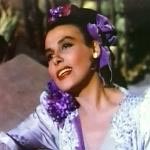
Whatever her mood, from sultry blues ballads to fiery jazz classics, Lena Horne was adored by audiences the world over, especially when she delivered her signature song, Stormy Weather.
Lena was born the great-granddaughter of a freed slave in Brooklyn, New York. At 16, she entered show business as a member of the chorus line at New York's famous Cotton Club. While still in her teens, she went on tour with an orchestra led by jazz bandleader Noble Sissle. In the 1940s, she was one of the first black performers hired to sing with a major white band, the Charlie Barnet Orchestra.
Lena's manager persuaded her to try acting, and in 1942, she made her debut in the Hollywood musical Panama Hattie. She eventually starred in two all-black films, Stormy Weather and Cabin In The Sky, but her subsequent screen roles were severely limited by racial attitudes of the era. As a result, she was only cast in movies as a nightclub singer, appearing in isolated segments in which she usually sang only one song. Those segments were cut altogether when the films were shown in the American South, where racial segregation was then practiced. That experience, along with other acts of discrimination, sparked her interest and work in the civil rights movement of the 1950s and '60s.

"When I went South, and met the kind of people who were fighting in such an unglamorous fashion, I mean, fighting just to get someplace to sit and get a sandwich, I felt close to that kind of thing because I had denied it and had been left away from it so long," said Lena Horne. "And I began to feel such pain again."
At the same time she was fighting prejudice, Lena Horne continued appearing with bands in nightclubs around the country, and making recordings of such standard blues favorites as Can't Help Lovin' That Man Of Mine.
Although blues were her specialty, Lena Horne's husky, contralto voice was equally at home with a variety of styles. She easily hypnotized audiences with her rendition of the classic Night And Day when set to a Latin beat.
In 1981, Lena Horne introduced her one-woman show on Broadway in New York City, Lena Horne: The Lady And Her Music. It ran for three years and earned her Broadway's highest honor, the Tony Award. The show went on to tour 40 cities in the U.S. and London.

In 1984, Lena Horne received the Kennedy Center Honors Award for her achievements in the performing arts. Singer Dionne Warwick paid tribute to Lena at the awards ceremony.
"She was, and still is, a pioneer for women, and especially for black women," said Dionne Warwick. "She has kept alive her inner fires, cast them into song, and warmed us all."
Lena Horne was presented the Grammy Award for Lifetime Achievement in 1989. One of her last albums, An Evening with Lena Horne, earned her a Grammy Award for Best Jazz Vocal Performance in 1995.
Legendary singer Lena Horne died on May 9 in New York City at age 92.
Remembering three who made their mark
Les Paul's electric guitar and inventions changed 20th century popular music
Leonard Bernstein, 1918-1990: musical great
Rock 'n' roll guitar legend Bo Diddley dies
(来源:VOA 编辑:陈丹妮)
